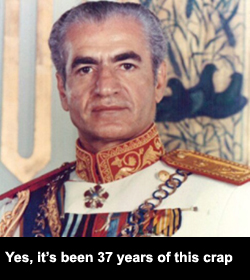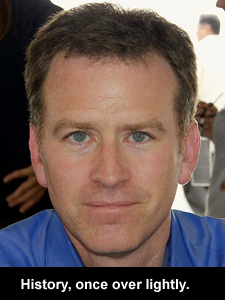I’m going to rant about something that has really gotten under my skin this week, and I want to say up front that I am not raising this in defense of Obama’s foreign policy so much as in response to a thirty-five year hyper-nationalist obsession that shows no sign of abating. I’m referring to the recent stories about the $400 million transfer to Iran coinciding with the release of some key detainees, and the consequent hysterical response and cries of “ransom!” on the part of center-right pols and pundits. Even purported liberals have adopted some of the language of this crusade, pointing out apparent “linkage” between the payment and the release. Let me make just a few points in response.
 First, the $400 million is not our money; it is Iran’s money. It represents funds paid by the Iranian people for arms sold to the despotic Shah before his overthrow; the arms were never delivered, and with the application of sanctions, the money was frozen, like the proceeds from oil sales. As a component of the nuclear deal, the United States and its partners agreed to free up this money while keeping the bulk of the sanctions in place. Once the agreement was settled, the administration apparently reserved delivery of these funds – the $400 million in cash, since Iran still can’t use the international banking system – as some surety that the prisoner release (negotiated as a side agreement) would actually happen.
First, the $400 million is not our money; it is Iran’s money. It represents funds paid by the Iranian people for arms sold to the despotic Shah before his overthrow; the arms were never delivered, and with the application of sanctions, the money was frozen, like the proceeds from oil sales. As a component of the nuclear deal, the United States and its partners agreed to free up this money while keeping the bulk of the sanctions in place. Once the agreement was settled, the administration apparently reserved delivery of these funds – the $400 million in cash, since Iran still can’t use the international banking system – as some surety that the prisoner release (negotiated as a side agreement) would actually happen.
So let me put this as simply as possible. Giving people back their own money is not the same as paying them ransom. I know it’s fun to play with the word “ransom”, but it simply doesn’t apply here.
Ironically, many of those who are now calling it “ransom” are the same fuckers who complained during the nuclear negotiations that Obama’s administration was not working hard enough to release the prisoners. Clearly they were working on this. But the return of Teheran’s money was not payment for the release; it was compliance with the terms of the nuclear agreement.
Lastly, this is not like the Iran/Contra scandal; not at all. Reagan was trying to find off-the-books ways to fund his terror army in Nicaragua, since funding had been prohibited by Congress. He arranged a sale of arms to Iran (while in the midst of helping Saddam Hussein attack Iran) as a payment for release of prisoners captured in Lebanon, then funneled the proceeds of the sale to the Contras. There was a quid pro quo there – arms for hostages – but also the broader crime of illegal aid to the psycho killers attacking community centers and health clinics in Nicaragua.
None of this will appear in the media coverage. That’s because the war party in the U.S. – Democrats and Republicans alike – have had Iran derangement syndrome since 1979. Iran took something from us back then and we have never forgiven them for it – something very valuable, namely, Iran. That means endless demagoguery on this issue, regardless of the facts.
luv u,
jp

 Anyway, there was the usual stories about boys choirs singing “Death to America!”, the “Down with Israel” chants, etc. (Probably could hear that in Times Square if you listen hard enough.)
Anyway, there was the usual stories about boys choirs singing “Death to America!”, the “Down with Israel” chants, etc. (Probably could hear that in Times Square if you listen hard enough.)